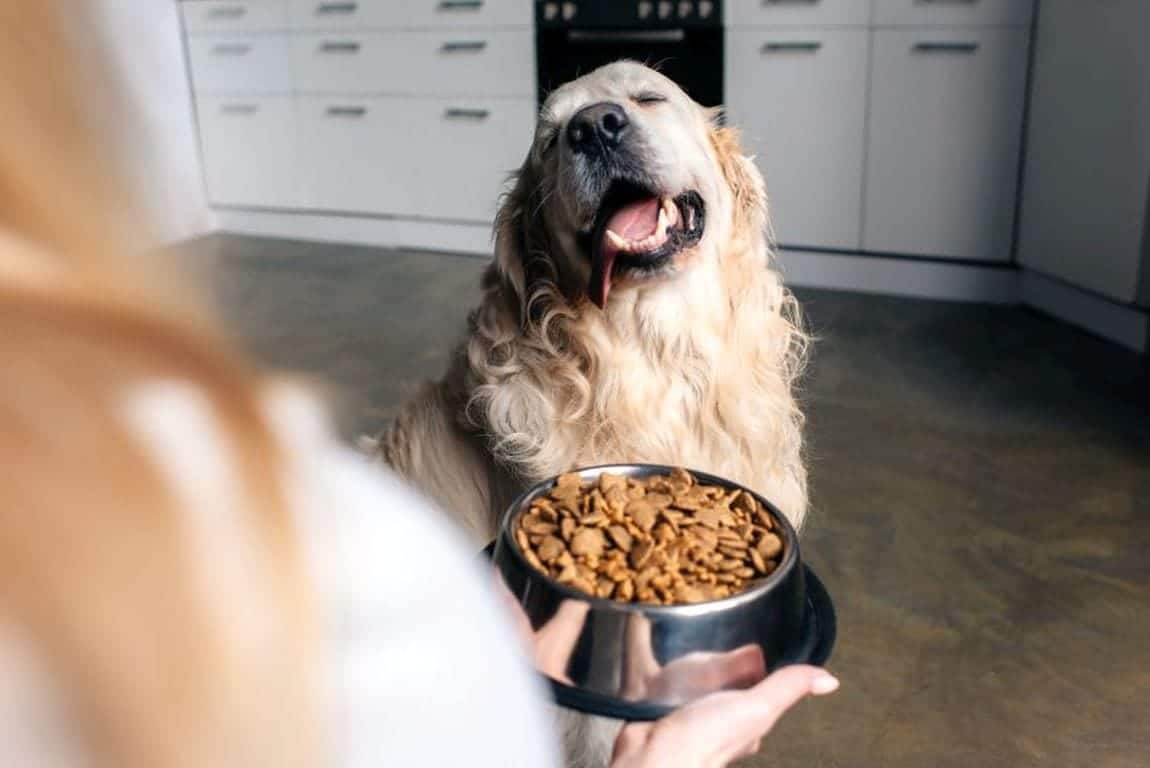Our cherished canine companions’ nutritional demands change as they age, necessitating a diet particularly formulated to support their aging bodies. In this comprehensive guide, we will explore the world of senior dog food, discussing the importance of tailored nutrition, the benefits of dry and wet options, and highlighting the best choices available in the market. Whether your senior dog has special nutritional needs or you simply want to provide them with the best care possible, this guide will help you make the best decisions for their health and well-being.
Unveiling the Secrets of Senior Dog Nutrition
As our four-legged pals reach their golden years, they must receive the proper nourishment to sustain their aging bodies. In this section, we will delve into the world of senior dog nutrition, discussing the significance of a tailored diet, the specific nutritional needs of senior dogs, common health concerns they may face, transitioning to senior dog food, and the importance of consulting with your veterinarian for personalized recommendations.
The Importance of Senior Dog Food
As dogs age, their bodies go through a variety of physiological changes that demand dietary alterations. Senior dog food is designed specifically to meet these changes and provide a well-balanced combination of nutrients to promote their general health and energy. It considers the unique requirements of senior dogs, such as reduced calorie requirements, joint support, and digestive health.
Key Nutritional Needs of Senior Dogs
Senior dogs require a diet that accommodates their evolving nutritional needs. While protein is still vital, it is critical to focus on high-quality, easily digestible protein sources. Additionally, increased levels of antioxidants, vitamins, and minerals also help to maintain their immune systems and prevent age-related diseases. Omega-3 fatty acids are essential for maintaining healthy skin and coat and lowering inflammation in aged joints.
Common Health Concerns in Senior Dogs
Dogs grow increasingly vulnerable to various health conditions as they age. These may include joint issues such as arthritis and decreased mobility, dental issues, weight management issues, and organ function loss. Senior dog food can help alleviate these worries by offering specific nutrition to manage and maintain these age-related diseases.
Transitioning to Senior Dog Food: Timing and Process
When should you start feeding senior dog food to your dog? It usually depends on your dog’s breed and size, as well as their overall health. Most dogs make the transition around the age of seven. To promote a smooth transition, gradually introduce the new food over a 7–10-day period, mixing it in increasing proportions with their current food.
Consulting with Your Veterinarian for Personalized Recommendations
Every dog is unique, and their dietary requirements may differ depending on breed, size, overall health, and any pre-existing problems. It is critical to check with your veterinarian for specialized dietary suggestions for your senior dog. They can examine your dog’s needs and recommend the best senior dog food products that meet their health and well-being requirements.
Best Dry Senior Dog Food
Dry dog food is a popular and easy option for feeding our senior canines. In this section, we will discuss the advantages of dry senior dog food, aspects to consider when selecting the best alternative, and give you a selection of the best options on the market. You may guarantee that your senior partner obtains the nutrition they require by studying the benefits of dry food and making an informed decision.
Benefits of Dry Senior Dog Food
Dry senior dog food has several advantages that make it a popular choice among pet owners. For starters, its crunchy texture aids tooth health by assisting in the reduction of plaque and tartar formation. Second, dry food has a longer shelf life, which makes it easier to store and feed. Furthermore, it frequently contains a well-balanced blend of nutrients required for the special needs of older dogs, such as joint support, weight management, and overall well-being.
Factors to Consider When Choosing Dry Senior Dog Food
Certain factors must be considered while choosing the best dry senior dog food to ensure that it fits your dog’s nutritional requirements and matches their needs. Keep an eye out for the following:
- High-quality ingredients: Choose dry dog foods with actual meat as the main ingredient and little fillers or artificial additives.
- Specific nutritional needs: Consider your older dog’s specific nutritional needs, such as joint difficulties or weight management, and select a dry meal that addresses those needs.
- AAFCO approval: Make sure the dry food you purchase satisfies the Association of American Feed Control Officials (AAFCO) criteria for quality and nutritional adequacy.
- Size and texture: Consider the size of the kibble as well as if it is suitable for your dog’s chewing skills and preferences.
- Price and affordability: Think about your budget as well as the quality and nutritional content of the dry dog food.
Best Dry Senior Dog Food
Consider the following three top dry senior dog food options:
#1. Veterinary Diet Mature Consult Dry Dog Food by Royal Canin
This dry dog food is designed exclusively for mature dogs and addresses age-related issues like joint health, weight control, and digestive support. It offers a well-balanced blend of high-quality proteins, fibers, and antioxidants to help elderly dogs stay healthy.
#2. Adult 7+ Small Bites Dry Dog Food by Hill’s
This dry food is designed for small-breed senior dogs and has easy-to-chew small kibble that tackles common aging concerns. It contains a precise blend of critical nutrients, antioxidants, and omega-3 fatty acids to help with brain function, mobility, and coat health.
#3. Grain-Free Senior Dry Dog Food by Merrick
This grain-free dry dog chow is formulated to suit the nutritional requirements of senior dogs while eliminating common allergies such as wheat and corn. Its main ingredient is deboned chicken, combined with a variety of fruits and vegetables and glucosamine for joint support.
How to Introduce Dry Senior Dog Food
To avoid stomach discomfort, it is critical to carefully transition your senior dog to new dry dog foods. Begin by including a small amount of the new food in their regular diet, gradually increasing the quantity of the new product over a week. Monitor your dog’s reaction and adjust the transition pace accordingly. To promote optimum hydration, remember to provide fresh water alongside dry food.
Best Wet Senior Dog Food
While dry dog food is popular, wet senior dog food is a tasty alternative that many pet owners and their senior companions enjoy. In this section, we will discuss the benefits of wet senior dog foods, aspects to consider when choosing the best option, and give you a list of the best options on the market. You may provide your senior dogs with a moist and nutritious dining experience by learning the benefits of wet food and making an informed decision.
Benefits of Wet Senior Dog Food
Wet senior dog food has several advantages that make it an enticing option for many pet owners. For starters, its high moisture content keeps your senior dog hydrated, which is especially important for individuals who may have decreased water intake. Furthermore, the soft and delicious texture of wet food is perfect for dogs with dental issues or who have difficulty chewing dry kibble. Wet food frequently has a high-quality protein, vitamin, and mineral blend that promotes general well-being and meets the special needs of senior dogs.
Factors to Consider When Choosing Wet Senior Dog Food
Certain factors must be considered while choosing the best wet senior dog food to ensure that it fits your dog’s nutritional requirements and matches their needs. Remember the following:
- High-quality ingredients: Choose wet dog foods with real meat as the principal ingredient, rather than fillers or artificial additives.
- Nutritional composition: Check the nutritional profile to check that the wet food contains a well-balanced blend of proteins, healthy fats, vitamins, and minerals that are appropriate for senior dogs.
- Specific dietary needs: Consider any unique nutritional needs your senior dog may have, such as digestive difficulties or diet sensitivities, and select a wet meal that fits those needs.
- AAFCO approval: Look for wet dog diets that have gained AAFCO approval, which indicates that they meet the nutritional adequacy guidelines.
- Packaging and storage: Take into account the packaging of the wet food, making sure it is simple to open and store. It’s critical to preserve any unused refrigerated portions and dispose of them according to the manufacturer’s instructions.
Best Wet Senior Dog Food
Consider the following three top wet senior dog food options:
#1. Blue Buffalo Homestyle Recipe Senior Wet Dog Food
This wet dog food is specially formulated for older dogs and features real meat as the first component. It contains a well-balanced blend of protein, healthy fats, fruits, and vegetables to support older dogs’ general health and well-being. To support joint health, the formula contains glucosamine and chondroitin, and it is devoid of poultry by-product meals, wheat, corn, and soy.
#2. Wellness CORE Grain-Free Senior Wet Dog Food
This grain-free wet food is made with high-quality proteins and nutrient-dense ingredients to fulfill the nutritional needs of senior dogs. It has a protein-rich basis, such as turkey, chicken, or beef, as well as a blend of superfoods and antioxidants to help with immunological health and vitality.
#3. Nutro Ultra Grain-Free Senior Wet Dog Food
This wet dog chow is made with a balance of lean proteins, superfoods, and 15 bright fruits and veggies. It contains a well-balanced combination of high-quality protein sources, omega fatty acids, and antioxidants that promote joint health, cognitive function, and immune system performance. The formula promotes good skin and a beautiful coat, helps digestion, and gives older dogs a nutrient-rich meal. It contains no poultry by-product meals, corn, wheat, or soy.
How to Introduce Wet Senior Dog Food
It is critical to gradually introduce wet senior dog chow into your animal friend’s diet to avoid stomach distress. Begin by combining a small amount of the wet food with their current food and gradually increasing the quantity of the wet food over a week or so. Monitor your dog’s reaction and alter the transition pace as needed. Remember to provide fresh water alongside the wet food to maintain hydration.
What is the best food to give an older dog?
The ideal diet for a senior dog is determined by several criteria, including their individual needs, health conditions, and preferences. However, in general, the following factors can help you choose the best diet for your senior dog:
- High-Quality Protein
- Adequate Fatty Acids
- Controlled Calories
- Joint Support
- Digestive Health
- Antioxidants and Nutritional Supplements
What age is senior dog food?
The age at which a dog is considered a senior varies based on breed and size. In general, dogs are considered seniors when they reach the age of 7 to 8 years. However, larger breeds tend to age faster than smaller breeds, so they may be considered seniors as early as 5 to 6 years old.
What is the difference between senior dog food and normal dog food?
Senior dog foods are lower in protein, fat, and carbohydrates than adult and puppy diets. This may or may not be beneficial to your pet. A higher carbohydrate and lower fat content is typically not a healthy thing and may indicate a cheaper dog food with more fillers.
What foods help old dogs gain weight?
If you have an older dog who needs to gain weight, you must address the issue in a balanced and healthy manner. The following meals can help older dogs gain weight:
- Protein-rich Foods
- Healthy Fats
- Calorie-Dense Foods
- Nutritional Supplements
- Frequent and Controlled Meals
- Food Toppers
Is milk good for older dogs?
While some dogs prefer milk and it is safe in small amounts, it is not generally recommended as a regular part of an older dog’s diet.
Should old dogs eat dry or wet food?
Wet dog food may be easy to chew and swallow for senior dogs. Wet food may be good if their oral health isn’t what it used to be or if they have difficulties swallowing.
Conclusion
Choosing the correct senior dog food is critical for our aging friends’ health and vigor. You can provide the best nutrition for your senior dog by knowing their changing nutritional demands, researching the benefits of dry and wet alternatives, and addressing any unique dietary restrictions. Whether you pick commercial senior dog food or homemade meals, always speak with your veterinarian to ensure you satisfy your dog’s specific needs. You can make their senior years genuinely sparkle with good diets, love, and care.
Related Articles
- 21 Worst Dog Food Brands To Avoid In 2023
- Best High Fiber Dog Food Brands In 2023
- Best 10 Dog Chews: The Ultimate Guide to Finding the Best Dog Chews for Your Canine Companion
- Top 10 Chicken-Free Dog Foods of 2024
- How to Feed a Dog with Giardia






